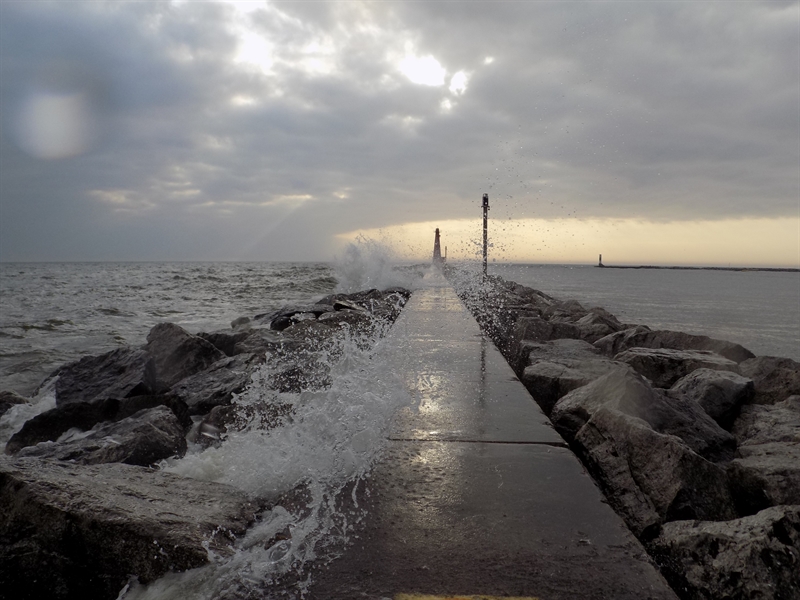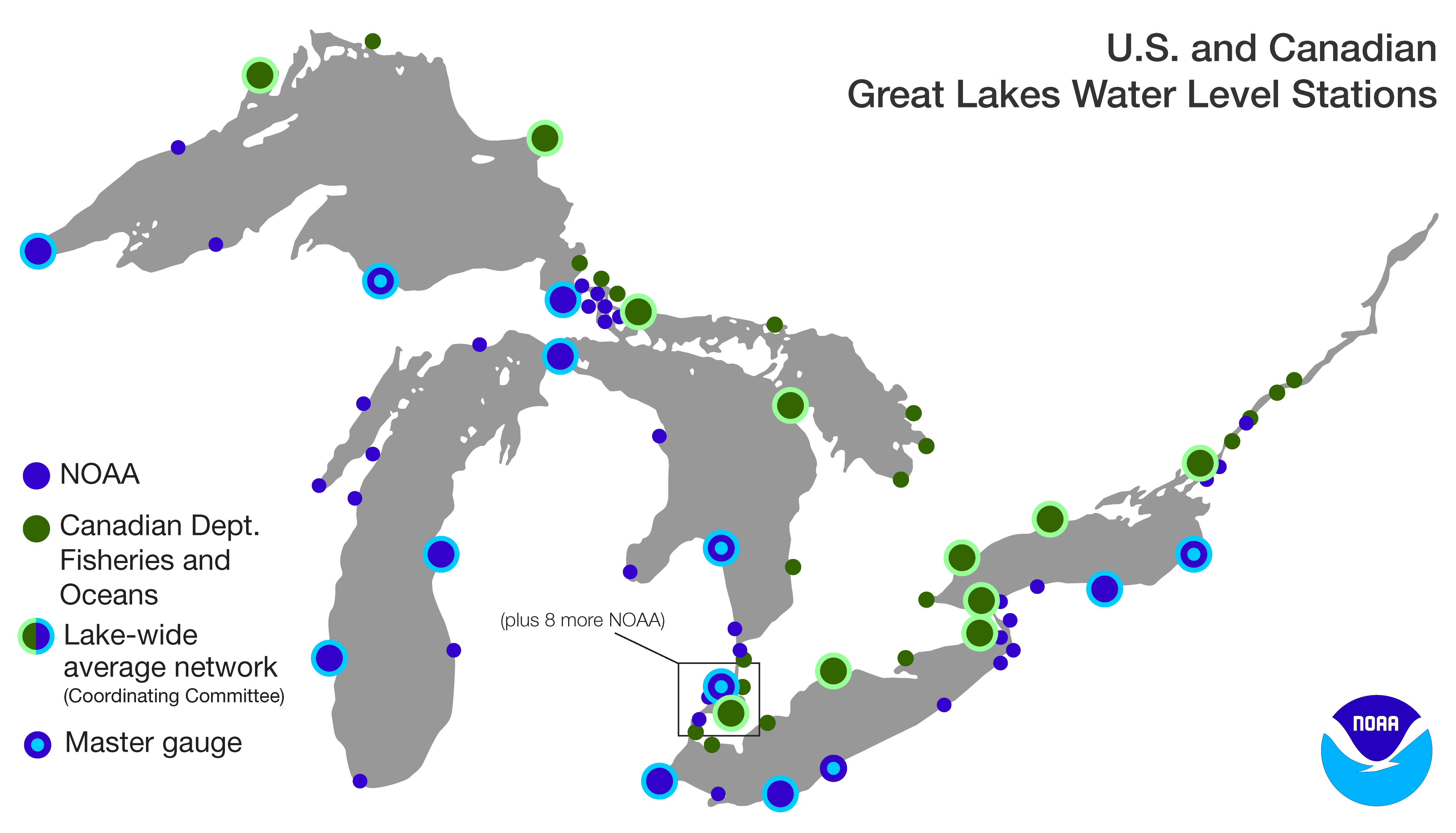Great Lakes Water Levels Predicted To Reach Record Highs This Year
Special Stories
30 May 2019 9:07 PM
[Overlooking Lake Superior and the Canal Park Light House, Duluth, Minnesota. Photo by ginger juel on Unsplash]
[NOAA] Several Great Lakes are expected to reach record high water levels in the next six months, thanks to above average precipitation in the watershed and large amounts of runoff this year. According to the Great Lakes water levels forecast, published by the U.S. Army Corps of Engineers in coordination with NOAA and Environment and Climate Change Canada, all-time high water level records on Lake Superior, Lake St. Clair and Lake Erie are expected to be met or broken this spring, while Lakes Michigan, Huron and Ontario are expected to also experience high — though not record-breaking — water levels.
“Several months of wet weather, including a significant snowpack across the northern Great Lakes basin and recent heavy rain events have pushed water levels higher than originally forecasted,” said Keith Kompoltowicz, chief of watershed hydrology at the U.S. Army Corps of Engineers, Detroit District.
 [Muskegon Light Pier, Lake Michigan, June 2015. Credit: NOAA]
Over the last few years, the Great Lakes have registered high water levels, reflecting wetter than average conditions in the region. In the spring of 2017, Lake Ontario broke its record high water level due to large amounts of precipitation and runoff, which, along with very high flows in the Ottawa River, helped lead to widespread flooding along the Lake Ontario-St. Lawrence River system. Though the Great Lakes experience seasonal cycles and extended periods of low or high water levels, scientists don’t point to the current high water level periods as evidence of a longer-term trend. The recently released Fourth National Climate Assessment predicts that water levels could decline in the future.
“When I began my career in 1986, the lakes were at record high levels. Since then they have experienced record lows and now have returned to record highs,” said Deborah Lee, director of NOAA’s Great Lakes Environmental Research Laboratory (GLERL). “The lesson for us is that the lake levels will continue to fluctuate and we need to be prepared for that variability. To that end, NOAA-GLERL uses the water level data continuously monitored by U.S. and Canadian federal agencies through a binational partnership to conduct research on components of the regional water budget to improve prediction of lake levels.”
[Muskegon Light Pier, Lake Michigan, June 2015. Credit: NOAA]
Over the last few years, the Great Lakes have registered high water levels, reflecting wetter than average conditions in the region. In the spring of 2017, Lake Ontario broke its record high water level due to large amounts of precipitation and runoff, which, along with very high flows in the Ottawa River, helped lead to widespread flooding along the Lake Ontario-St. Lawrence River system. Though the Great Lakes experience seasonal cycles and extended periods of low or high water levels, scientists don’t point to the current high water level periods as evidence of a longer-term trend. The recently released Fourth National Climate Assessment predicts that water levels could decline in the future.
“When I began my career in 1986, the lakes were at record high levels. Since then they have experienced record lows and now have returned to record highs,” said Deborah Lee, director of NOAA’s Great Lakes Environmental Research Laboratory (GLERL). “The lesson for us is that the lake levels will continue to fluctuate and we need to be prepared for that variability. To that end, NOAA-GLERL uses the water level data continuously monitored by U.S. and Canadian federal agencies through a binational partnership to conduct research on components of the regional water budget to improve prediction of lake levels.”
 [The map above shows the locations for the 53 NOAA/NOS Center for Operational Oceanographic Products and Services (CO-OPS) water level stations on the Great Lakes and connecting channels (blue circles). These stations record a 3 minute average water level every 6 minutes. (Credit: NOAA)]
Researchers at GLERL analyze components of the Great Lakes water cycle—runoff, over-lake precipitation, over-lake evaporation—to improve models, which are used by the U.S. Army Corps of Engineers and industry to develop lake level forecasts and plan for water management and operations.
NOAA’s Center for Operational Oceanographic Products and Services (CO-OPS) and Fisheries and Oceans Canada maintain a network of stations across the Great Lakes that monitor near real-time water levels, currents and weather. The data is used for international navigation, planning for coastal development, support for spill response, search and rescue, recreation, weather forecasts, and monitoring climate change.
Great Lakes water levels have a significant impact on Great Lakes residents. Because of this month’s forecast, residents should prepare for an increased risk of erosion and minor flooding during storm events.
Edited for WeatherNation by Meteorologist Mace Michaels
[The map above shows the locations for the 53 NOAA/NOS Center for Operational Oceanographic Products and Services (CO-OPS) water level stations on the Great Lakes and connecting channels (blue circles). These stations record a 3 minute average water level every 6 minutes. (Credit: NOAA)]
Researchers at GLERL analyze components of the Great Lakes water cycle—runoff, over-lake precipitation, over-lake evaporation—to improve models, which are used by the U.S. Army Corps of Engineers and industry to develop lake level forecasts and plan for water management and operations.
NOAA’s Center for Operational Oceanographic Products and Services (CO-OPS) and Fisheries and Oceans Canada maintain a network of stations across the Great Lakes that monitor near real-time water levels, currents and weather. The data is used for international navigation, planning for coastal development, support for spill response, search and rescue, recreation, weather forecasts, and monitoring climate change.
Great Lakes water levels have a significant impact on Great Lakes residents. Because of this month’s forecast, residents should prepare for an increased risk of erosion and minor flooding during storm events.
Edited for WeatherNation by Meteorologist Mace Michaels
 [Muskegon Light Pier, Lake Michigan, June 2015. Credit: NOAA]
Over the last few years, the Great Lakes have registered high water levels, reflecting wetter than average conditions in the region. In the spring of 2017, Lake Ontario broke its record high water level due to large amounts of precipitation and runoff, which, along with very high flows in the Ottawa River, helped lead to widespread flooding along the Lake Ontario-St. Lawrence River system. Though the Great Lakes experience seasonal cycles and extended periods of low or high water levels, scientists don’t point to the current high water level periods as evidence of a longer-term trend. The recently released Fourth National Climate Assessment predicts that water levels could decline in the future.
“When I began my career in 1986, the lakes were at record high levels. Since then they have experienced record lows and now have returned to record highs,” said Deborah Lee, director of NOAA’s Great Lakes Environmental Research Laboratory (GLERL). “The lesson for us is that the lake levels will continue to fluctuate and we need to be prepared for that variability. To that end, NOAA-GLERL uses the water level data continuously monitored by U.S. and Canadian federal agencies through a binational partnership to conduct research on components of the regional water budget to improve prediction of lake levels.”
[Muskegon Light Pier, Lake Michigan, June 2015. Credit: NOAA]
Over the last few years, the Great Lakes have registered high water levels, reflecting wetter than average conditions in the region. In the spring of 2017, Lake Ontario broke its record high water level due to large amounts of precipitation and runoff, which, along with very high flows in the Ottawa River, helped lead to widespread flooding along the Lake Ontario-St. Lawrence River system. Though the Great Lakes experience seasonal cycles and extended periods of low or high water levels, scientists don’t point to the current high water level periods as evidence of a longer-term trend. The recently released Fourth National Climate Assessment predicts that water levels could decline in the future.
“When I began my career in 1986, the lakes were at record high levels. Since then they have experienced record lows and now have returned to record highs,” said Deborah Lee, director of NOAA’s Great Lakes Environmental Research Laboratory (GLERL). “The lesson for us is that the lake levels will continue to fluctuate and we need to be prepared for that variability. To that end, NOAA-GLERL uses the water level data continuously monitored by U.S. and Canadian federal agencies through a binational partnership to conduct research on components of the regional water budget to improve prediction of lake levels.”
 [The map above shows the locations for the 53 NOAA/NOS Center for Operational Oceanographic Products and Services (CO-OPS) water level stations on the Great Lakes and connecting channels (blue circles). These stations record a 3 minute average water level every 6 minutes. (Credit: NOAA)]
Researchers at GLERL analyze components of the Great Lakes water cycle—runoff, over-lake precipitation, over-lake evaporation—to improve models, which are used by the U.S. Army Corps of Engineers and industry to develop lake level forecasts and plan for water management and operations.
NOAA’s Center for Operational Oceanographic Products and Services (CO-OPS) and Fisheries and Oceans Canada maintain a network of stations across the Great Lakes that monitor near real-time water levels, currents and weather. The data is used for international navigation, planning for coastal development, support for spill response, search and rescue, recreation, weather forecasts, and monitoring climate change.
Great Lakes water levels have a significant impact on Great Lakes residents. Because of this month’s forecast, residents should prepare for an increased risk of erosion and minor flooding during storm events.
Edited for WeatherNation by Meteorologist Mace Michaels
[The map above shows the locations for the 53 NOAA/NOS Center for Operational Oceanographic Products and Services (CO-OPS) water level stations on the Great Lakes and connecting channels (blue circles). These stations record a 3 minute average water level every 6 minutes. (Credit: NOAA)]
Researchers at GLERL analyze components of the Great Lakes water cycle—runoff, over-lake precipitation, over-lake evaporation—to improve models, which are used by the U.S. Army Corps of Engineers and industry to develop lake level forecasts and plan for water management and operations.
NOAA’s Center for Operational Oceanographic Products and Services (CO-OPS) and Fisheries and Oceans Canada maintain a network of stations across the Great Lakes that monitor near real-time water levels, currents and weather. The data is used for international navigation, planning for coastal development, support for spill response, search and rescue, recreation, weather forecasts, and monitoring climate change.
Great Lakes water levels have a significant impact on Great Lakes residents. Because of this month’s forecast, residents should prepare for an increased risk of erosion and minor flooding during storm events.
Edited for WeatherNation by Meteorologist Mace MichaelsAll Weather News
More